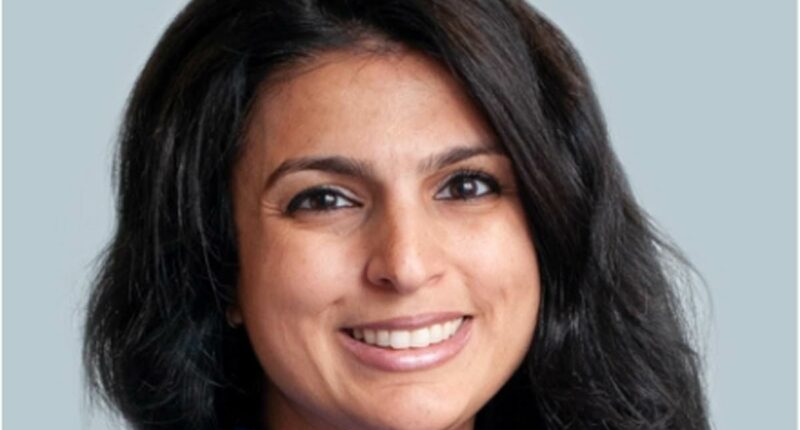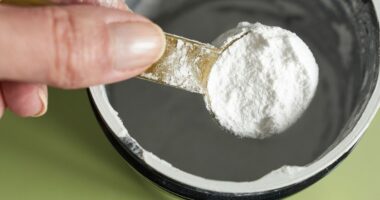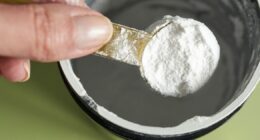Share this @internewscast.com
Medical professionals are warning about common routines followed by millions of Americans that unknowingly increase their risk of having a stroke.
Every three minutes and 14 seconds, one American loses their life due to a stroke. Ischemic strokes, which account for about 87% of all cases, occur when a clot obstructs a blood vessel supplying the brain, depriving brain cells of essential oxygen and nutrients.
The remaining 13% of strokes are hemorrhagic, happening when a weakened blood vessel bursts and bleeds into nearby brain tissue. The primary factor for both stroke types is high blood pressure, often called the ‘silent killer.’
While strokes can seem to appear suddenly, many of the risks that lead to them are built by the decisions people make every day.
Dr. Anahita Dua, a vascular surgeon at Massachusetts General Hospital, explained to the Daily Mail that the increasing stroke rates among younger people are due to the prevalence of the western diet, a sedentary lifestyle, and certain prevalent diseases in society, which are causing overall poorer health.
She also mentioned that limited access to healthcare is especially challenging for those working in the gig economy, who typically lack employer-provided health insurance. As a result, health issues that arise in their 30s, 40s, and 50s may lead to more severe consequences in their 60s and 70s.
Sitting for extended periods, relying on processed foods, and neglecting preventive care significantly contribute to stroke risk. However, by making focused and feasible adjustments in these areas, individuals can actively safeguard their health and greatly enhance their chances for a healthier future.

A sedentary desk life, a processed food diet, and skipped doctors appointments are active drivers of stroke risk (stock)
Incidence of stroke had been on a steady decline among over-50s since the 1990s before plateauing and then rising in recent years, according to American Heart Association data.
Despite a 20 to 30 percent drop in individual risk for older adults since 1990, the total number of strokes in this group has risen sharply due to an ever-growing senior population.
Younger adults, meanwhile, are seeing a grim rise. While stroke incidence has fallen for those over 50, it is moving in the opposite direction for adults aged 15 to 49, particularly in specific states across the South and Midwest.
The alarming shift suggests that modern risk factors, such as rising rates of obesity, hypertension and diabetes in younger populations, are now outpacing the medical advances that have protected older generations, signaling a new and urgent public health challenge.
Prolonged sitting disrupts the metabolism, raising blood sugar and triglycerides (fat in the blood) while lowering good cholesterol, damaging blood vessels and promoting the accumulation of artery-clogging plaque.
At the same time, stagnant blood flow in the legs increases the risk of clots, which can travel to the brain and cause a stroke.
Dr Dua said: ‘Our jobs are pretty sedentary, and that leads to other problems, like diabetes, high blood pressure, of course, and smoking; and while it is overall decreasing, is still very, very prevalent.
‘And these three risk factors, the diabetes, the smoking and the high blood pressure, specifically the high blood pressure, are the primary causes of damage to the inside lining of blood vessels.’

Dr Anahita Dua, a prominent vascular surgeon at Massachusetts General Hospital, told the Daily Mail that sedentary jobs contribute directly to major health issues like diabetes and high blood pressure, noting that smoking also remains a widespread problem. These factors are primary culprits that damage the inner lining of blood vessels
A diet heavy in processed and fast foods launches continuous assaults on the cardiovascular system, primarily through a massive sodium load.
Dr Dua said: ‘Certain processed foods that are high, not only in sodium, which causes high blood pressure, but also saturated fat, for example, bacon, really have a serious impact.
‘Now, anything in moderation is fine, but obviously, if you couple that with a genetic predisposition to having these diseases, you have a problem, right?’
Excess salt raises blood pressure by increasing blood volume, which over time damages arteries and makes them prone to rupture or clots.
Salty, processed foods are often loaded with unhealthy saturated and trans fats, which contribute to the buildup of atherosclerotic plaque. This narrows the arteries and forces the heart to work even harder, further elevating blood pressure.
The combination of hardened, narrowed arteries and chronically high pressure creates a prime environment for ischemic or hemorrhagic stroke. Ignoring hypertension (high blood pressure) allows it to damage the arteries, compounding the damage exponentially.
Dr Dua said: ‘[Young people] who are not necessarily in a steady, run-of-the-mill job that’s 40 hours a week that’s giving them health insurance, couple that with the money that they probably make on and off on in the gig economy… that’s not somebody that’s going to be buying fresh fruits and vegetables and preparing them.
‘So what are they eating? They’re eating the hardcore processed meals, high in all these things, the sodium, the fat … and unfortunately, that translates to high blood pressure.’
Smoking is another daily habit that, over time, drastically increases one’s risk of suffering a stroke. Neurologists reported in 2011 that current smokers have at least a two- to four-fold increased risk of stroke compared with lifelong nonsmokers or individuals who had quit smoking more than 10 years prior.

From 2001 until the early 2010s, stroke death rates fell significantly across all US regions. But this graph shows that progress has stalled and reversed. After 2020, stroke death rates began to rise again in every region
The chemicals in tobacco smoke directly impact the cardiovascular system by damaging vessel walls, thickening the blood and speeding up plaque accumulation, creating a triple threat for triggering a stroke.
Consistently sleeping fewer than six hours also significantly increases stroke risk. One major study of 90,000 older women found that short sleepers had a 22 percent higher risk of ischemic stroke, a link that was strongest in those who were otherwise healthy, indicating poor sleep is an independent risk factor.
This pattern held across demographics, with other large studies confirming that short sleep can more than double stroke risk in both men and women of various ages.
‘Sleep is directly associated with regeneration of your body,’ Dr Dua said. ‘In these people that have injury to the blood vessel for whatever the reason may be, if they’re not getting appropriate sleep, they’re not able to regenerate and heal whatever injury they initially sustained. That translates to continuing the process that ultimately leads to stroke.’
Skipping routine health screenings is another dangerous gamble with one’s long-term health, Dr Dua added. Regular check-ups are the most crucial line of defense and act as an early warning system for silent but deadly conditions like high blood pressure, high cholesterol and diabetes.
By the time symptoms finally appear, the underlying disease may already be in an advanced stage. Early detection allows for timely intervention through lifestyle changes or medication, which can stop the progression of vascular disease and dramatically reduce the risk of a future heart attack or stroke.

















